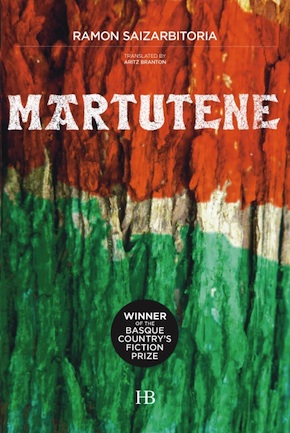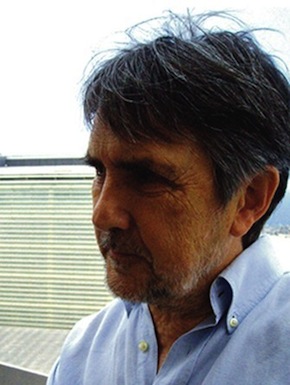A loftier reality
by Mika Provata-Carlone
“A novel that rightfully deserves being included among the greatest novels of the twenty-first century.” El Cultural
Broken loves, heart-stopping encounters, death and maimed lives, grand visions, disillusionment and a country precariously balanced between terror and resolute optimism; between organic belonging and absolute, unalloyed autonomy. Martutene begins ambitiously as a metanarrative about storytelling, a novel about real or fictional persistent storytellers who are likened to kidnappers of others’ attention. Or about reluctant listeners, numbed by personal trauma or lost in a crowded vacuum of indifference.
Ramon Saizarbitoria’s first story-within-a-story, or rather his first container of multiplying echoes, is the “parable about the cattle cars full of Jews on their way to Auschwitz or Dachau” – a horror version of Plato’s Cave, where prisoners lifted one of their own to the height of the ventilation slits so they could report back to them the nightmare that had usurped reality. Plato used myths – a highly controversial medium for a philosopher, for Plato most particularly – in order to allow us a fuller vision of the world in its highest resolution, in its essence, beyond the shadows of appearance. With well-calibrated narrative pluck and purpose, Saizarbitoria undertakes a similar task: he weaves together into a suspenseful whole stories, parables, myth, history, material reality and spiritual angst in order to create a tapestry of individual fates and the destiny of a nation.
Egotistical writers and self-effacing authors, hard-core ETA nationalists and ordinary people conscious of a unique, ancient tradition and language, clash to resist “bland, easy literature that delighted undemanding readers” as well as a rhetoric of progress, scientific hegemony and de-cultured modernity. Because, as Saizarbitoria reminds us by way of Samuel Beckett, “only those without memory can recall.”
Do scars, real and emotional, enable us to be more human? Or are we all masters “at not seeing what [we do not] want to” like Martin, the reader/writer/character of Martutene? Spain, Saizarbitoria seems to be saying, is a master at not seeing the Basque Country and its distinctiveness, just as the Basque have perhaps lost sight of what gave birth to and guaranteed their legacy in their struggle for territorial autonomy and identity.
Querying the foundations of national identity and guilt, ambition, and the anxiety not to be at the margins of what is deemed Western, intellectual, prosperous, Martutene is a dreamy ode to the Basque nation and its language, which is allowed to interlace itself through the narrative mystically, powerfully, an intimation of a strangely desirable universe, yet also reminding us of an inherent, inescapable duality, of conflict and equally yearned-for loyalties: an either/or that yearns to be and/or. This is a novel about slow reading that talks to authors that live in other novels, wielding a secret code of secondary lives. It is a quietly raging history of the Basque people past and present, a ‘Short History’ after Ernst Gombrich or a Bildungsroman after Thomas Mann, John Dos Passos, Faulkner or Thomas Wolfe, a mythopoeia of literary confluences after James Joyce and Derek Walcott. Individual empowerment, extremism, cultural insularity, sterile relations and alienation are the mirror image of a story involving the new generation, magnified into a sociohistorical metaphor: an old society trying to be new without losing roots or authenticity, against a younger generation that is passive, materially ambitious, disinterested, cosmopolitan and chauvinist at the same time.
Martutene is a novel that calls for the simple luxury of time and pleads for old-fashioned slow reading against a modern, overly hasty world. It is, in many ways, a total narrative, an intrepid, obsessive attempt at total fiction.”
Another novel, Max Frisch’ Montauk of 1975, becomes the code-breaking grid and permeating metaphor, just as a profession acts as the metalanguage for a nation: quotes become mouthpieces, the ‘base-building’ for writing, the spurs of communication or the intractable statements of an impossible genuineness. Pieced together, they claim to be the narrative no one wrote about us, that nonetheless exists through the sheer alchemy of language. Quotes become the omens of unspeakable yearnings, incurable loneliness, they are inescapable warnings of fatality but also of thwarted common sense. The mundane weighs terrifyingly on the recollection and retrospective assessment of history, the horrific itself becomes familiar, sinisterly mundane. An insular view of the powers of idealised science exposes our all too human limits, and the field of pre-natal and neonatal care, the passion and treadmill of the Ulysses-figure of Martutene, Dr Abaitua, who lives both the fiction and the reality of life, stands not only for the humanism that is often lost under the pressure of commercial gain, but also for the care required in the gestation and birth of a new nation –as well as the problematic idolisation of rationalism vs. reason and common understanding.
Martutene is a novel that calls for the simple luxury of time and pleads for old-fashioned slow reading against a modern, overly hasty world. It is, in many ways, a total narrative, an intrepid, obsessive attempt at total fiction. Through complex and effective experimentation with the diary as a literary form, Saizarbitoria explores the reality between image and substance, male and female stereotypes, intellectualism and intelligence, understanding and communication, the personal and the universal, temporality and death, through a highly engaging, intriguing, challenging piece of writing that asks us to look closely at emblematically simple, tangled human lives. Political engagement and its effect on the social fibre, national instinctiveness and the real possibility of free will and independent action, sincerity and beauty, are themes that converge in a kind of externalised introspection, following Céline’s “le destin m’a choisi pour être le missionnaire de la vérité.”
The inscribed aim of the novel is to be ‘like a painting by Hopper’ – and a Basque one at that, a painting that would capture the shades and linear forms of Unamuno, Loyola, Savater.”
There is a certain asymmetry between novelistic aim and the sheer impetus of this unabashedly prodigious volume, yet Martutene cannot fail to captivate readers who relish thinking as much as they relish a fine yarn. Part of its charm is its unquestionable Basqueness, the voice, that even in translation, cannot fail to resonate with its poise, dignity, brittle self-sufficiency. For Saizarbitoria, it is above all a vital life force, waiting for the right definition, for a vision beyond the trauma, the terror, the inevitable pain involved in the birth of a nation across two countries and in constant amalgamation and friction with all that is deemed other, as well as with itself. Martutene celebrates beginnings and changed courses as much as it respects sorrow and seeks answers to unsolvable questions, the relics of ETA’s “years of lead” or the “voices that are ashamed and remain in silence in the Basque-speaking world… Hypocritical voices that choose not to speak so that it won’t be obvious they’ve been silent.”
Books – and Martutene resolutely positions itself in such a role – become guides, Ariadne’s threads for a society that has become its own Minotaur, but also the oracles of dark destinies, unless one reads diachronically, cross-culturally, in order to break down not only cultural solipsism but also the curse of generationally horizontal societies, with no intersection between age groups except that of numbness, paralysis, uncertainty. The inscribed aim of the novel is to be “like a painting by Hopper” – and a Basque one at that, a painting that would capture the shades and linear forms of Unamuno, Ignatius Loyola, Fernando Savater in a here and now that must unite inner and outer form and essence.
At the end of the novel, a Stephen-Dedalus figure in easy circumstances burns his magnum opus; an Odysseus-Bloom goes back to an unmollified, very busy Penelope; a mother tears up the letter of a deceased father to his son, an action of transgression to stop greater violence and destruction, to curtail terrorism, prevent the terrorisation of both memory and the future. Martutene is a tumultuous invitation to an encounter, to a long meditation, to conscious reflection. In some ways, it is also a challenge: can we remain in focus throughout its 800+ pages? Martutene could certainly have been more succinct, shorter, easier on the wrist that holds it and the eye that scans its pages; yet Saizarbitoria proves that it does not have to be anything less than it is.
 Ramon Saizarbitoria was born in San Sebastián in 1944. His first novel Egunero Hasten Delako (Because every day begins, 1969) is recognised as the first modern Basque novel. Ehun Metro (One hundred meters), his second novel, was seized by the Franco regime in 1974 and not published until 1976. His latest, Lili eta biok (Lili and me, 2015), won the Critics Prize for Literature. Martutene (2013), his tenth novel, won the Basque Country’s Fiction Prize and is now published by Hispabooks in a translation by Aritz Branton. Read more.
Ramon Saizarbitoria was born in San Sebastián in 1944. His first novel Egunero Hasten Delako (Because every day begins, 1969) is recognised as the first modern Basque novel. Ehun Metro (One hundred meters), his second novel, was seized by the Franco regime in 1974 and not published until 1976. His latest, Lili eta biok (Lili and me, 2015), won the Critics Prize for Literature. Martutene (2013), his tenth novel, won the Basque Country’s Fiction Prize and is now published by Hispabooks in a translation by Aritz Branton. Read more.
Mika Provata-Carlone is an independent scholar, translator, editor and illustrator, and a contributing editor to Bookanista. She has a doctorate from Princeton University and lives and works in London.

